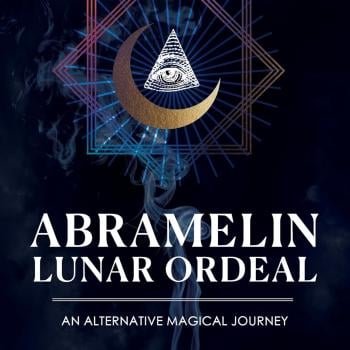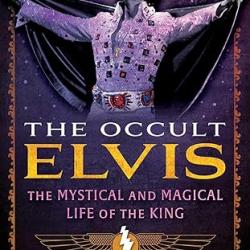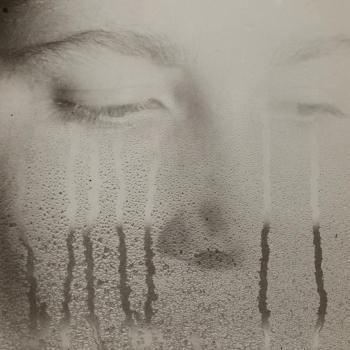Serious cases of mental illness should always be referred to mental health professionals. However, those with mild cases who choose to self-treat may benefit from herbs and supplements, along with calling on a couple of Greek deities.
Mental Illness in Greek Mythology
In his essay, “Where Does Mental Illness Come From? Greek mythology vs. psychiatric mythology”, Michael Fontaine PhD argues that Greek mythology and psychiatry are closely connected. In mythology, characters are defined by the actions rather than their personalities, and there are reasons for their deviant behaviors. He offers the following examples:
Hercules returns from war and shoots his family. He has PTSD. Hercules is tormented by memories of the horrible things he’s done in war.
Medea kills her children. She has depression. Medea has been abandoned by her husband in a foreign land, with two children to take care of.
Orestes hears voices and kills his mother. He has schizophrenia. Orestes is coming of age, eager for his inheritance, and angry at the world.
Fontaine states that mental illnesses are not the result of chemical imbalances or brain diseases, and thus drugs are not the best way to treat them.
Ancient Greek conception of the origin of mental illness
William V. Harris, a professor of history and director of the Center for the Ancient Mediterranean at Columbia University, studies mental illness in the classical world—ancient Rome and Greece:
“Many people in antiquity thought that mental disorders came from the gods. The Greek gods are a touchy lot, quick to take offense. For instance, they took a hard line with Orestes after his matricide. [Ed. Note: After killing his mother, Orestes was tormented by the Furies.] And in a world where many important phenomena such as mental illness were not readily explicable, the whims of the gods were the fallback explanation.
Physicians and others fought against this idea from an early date (the 5th century B.C.), giving physiological explanations instead. Many people sought magical/religious remedies—such as going to spend the night in a temple of the healing god Asclepius, in the hope that he would work a cure or tell you how to get cured—[while physicians sought] mainly medical ones. No one thought that it was the duty of the state to care for the insane. Either their families looked after them, or they ended up on the street—a nightmare situation.”
Treating mental illness using the Pythagorean Way of Life
Nicholas Kardaras PhD in his book How Plato and Pythagoras Can Save Your Life claims that depression and anxiety can be cured by
“a very holistic way of living that had been known in the ancient world as the ‘Bios Pythagorikos’ (the Pythagorean Way of Life) that included a healthy vegetarian diet, daily rigorous physical exercise, and philosophical group discussions (dialectical discussions) that were meant to help a person better understand their universe and their purpose within that universe.
And living ethically was also essential. For the Greeks, act-right/think-right were the keys towards well-being.
Participants in my study who immersed themselves into this more engaged, reflective way of life experienced the following: meaningfully increased levels of personal as well as transpersonal awareness; an increased appreciation for life (as well as death); an increased sense of purpose in their lives; an increased sense of concern for others, as well as an increased sense of spirituality and self-acceptance.”
Nicholas Kardaras’ approach can be spelled out as follows:
“A diet rich in omega-3 fatty acids
Foods such as walnuts, olive oil, salmon, and chia seeds contain omega-3 fatty acids. Interestingly, many new studies have revealed that this fatty acid acts as an authentic neuroprotective agent.
Regular exercise
Gymnasiums in Ancient Greece were institutions dedicated to physical and spiritual instruction. Therefore, one discipline was related to the other. These days, we often neglect the importance of physical exercise, staying active, and connecting with our environment, nature, and ourselves.
Sunlight
This is one of the main keys of the Greek cure for depression. If we think about it, we don’t even see the sun that much these days. We’re surrounded by artificial lights at our jobs packed with electronic devices. This type of light directly affects our ability to rest and, consequently, our health. Thus, we should sunbathe as much as we can.
Do things that distract you from negative feelings
The Greeks treasured everything that lead to enjoyment and relaxation and focused the things that made them forget about their worries. By this we’re not saying that you have to practice hedonism. However, you should definitely learn to enjoy the time you can spend doing what you like. You have to allow yourself to be free, happy, and creative.
Dialectics as a cure for depression and anxiety
Dialectics is the art of confronting, listening, debating, relativizing, learning, renewing ideas, and discovering purposes. More than anything, it implies enriching ourselves with social contacts who can enlighten us with their perspectives, people who can challenge us with their energy, vitality, and optimism.”
Greek Deities for Mental Illness
I believe that if you look hard enough, you’ll find a Greek deity for any situation.
Pan
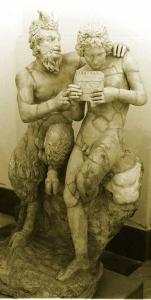
Pan teaching his eromenos [passive male partner], the shepherd Daphnis, to play the pan flute, Roman copy of Greek original c. 100 BC, found in Pompeii.
“Pan was a god for whom there were fourteen versions of his parentage, but mostly his father as Hermes, while his mother was usually a nymph. He was portrayed as a man with goat feet and horns, and usually ithyphallic, or having a constant erection. He was a shepherd god and protector of shepherds, to whom were sacrificed kids, goats, or sheep, or alternatively presentations were made of votive offerings of herdsmen statuettes. He was also a hunting god presiding over small animals and birds, with Artemis was concerned with larger game. Pan’s name means ‘shepherd’ or literally ‘feeder’ [early Greek Paon]. He could sometimes be frightening as suggested by the derivation of panic from his name. He was venerated in caves and symbolized procreation. He invented the panpipe (seven-reed syrinx) and was capable of causing panic in individuals, animals, and armies. He was the god of nature, and lord of the satyrs.”
[Mierzwicki, Hellenismos, 49]Because Pan is the origin of the word “panic”, he would tie in with panic disorder and more general anxiety disorders. Developing a relationship with Pan may well aid in overcoming anxiety disorders.
Orphic Hymn 11. For Pan
Incense: mixed
I call mighty Pan, the god of shepherds and the whole universe together;
sky and sea, the all-regal earth, and deathless fire: for these are the limbs of Pan himself.
Come, blessed, spinning, cavorting, enthroned with the Seasons,
goat-limbed, Bacchic, frenzy of gods’ inspiration under the stars.
You strike cosmic harmony with playful song.
You, the aid of imagination and bringer of terrible images to mortal fears,
delighting in shepherds and herdsmen among the fountains.
Sharp-eyed hunter, the lover of Echo, you dance with the nymphs.
All-growing god, the father of all, many-named daimon, the ruler of the cosmos,
increaser, light-bringer, fruitful Paian, cave-haunting god, heavy with wrath, truly the horned Zeus,
for through you the boundless plain of the Earth lies firm,
but deeply flowing waters of the tireless seas yield, and Ocean, surrounding the earth with waters,
and the air that we share for nourishment, the spark of all life, the eye of most nimble fire high above:
For these holy things stand apart by your command; you change the natures of all by your wise
will, nourishing the human race throughout the boundless world.
So come, blessed one, frenzied with divine inspiration to this most holy libation:
give life a good end and send out Pan’s passion to the earth’s ends.
[Note: Pan’s name is the origin of the English word “panic.” He was said to inspire frenzy in those lost in the wilderness. His name’s similarity to the Greek word for “all” has led some later writers to regard him as a universal deity.] [Translation from Dunn, The Orphic Hymns]
Oizys
Oizys was the personified spirit (daimona) of misery and woe, distress and suffering. She was one of the malevolent children of Nyx (Night). Her Roman Name was Miseria.
Oizys would tie in with depression, and so developing a relationship with her may well aid in overcoming this debilitating condition. Sadly, there are no visual representations of her and no invocations. Hesiod, in his Theogony, refers to her as “painful Oizys”, so for those wishing to compose their own invocation, I would suggest incorporating this epithet.
Hesiod, Theogony 211 ff (trans. Evelyn-White) (Greek epic C8th or C7th B.C.):
“And Nyx (Night) bare hateful Moros (Doom) and black Ker (Violent Death) and Thanatos (Death), and she bare Hypnos (Sleep) and the tribe of Oneiroi (Dreams). And again the goddess murky Nyx, though she lay with none, bare Momos ( and painful Oizys (Misery), and the Hesperides . . . Also she bare the Moirai (Fates) and the ruthless avenging Keres (Death-Fates) . . . Also deadly Nyx bare Nemesis (Envy) to afflict mortal men, and after her, Apate (Deceit) and Philotes (Friendship) and hateful Geras (Old Age) and hard-hearted Eris (Strife).”
Overview of mental illness in the USA
Mental illness is a huge problem that impacts two in ten Americans, one of whom will seek treatment, while the other won’t out of a fear of stigma, prejudice and discrimination. The problem is growing fastest among young adults.
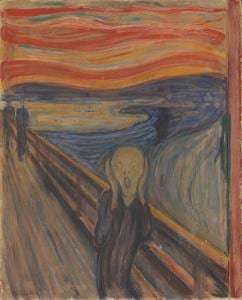
Edvard Munch, 1893, The Scream. National Gallery of Norway.
The National Institute of Mental Health advises that:
“Mental illnesses are common in the United States. Nearly one in five U.S. adults live with a mental illness (51.5 million in 2019). Mental illnesses include many different conditions that vary in degree of severity, ranging from mild to moderate to severe. Two broad categories can be used to describe these conditions: Any Mental Illness (AMI) and Serious Mental Illness (SMI). AMI encompasses all recognized mental illnesses. SMI is a smaller and more severe subset of AMI. …
Any mental illness (AMI) is defined as a mental, behavioral, or emotional disorder. AMI can vary in impact, ranging from no impairment to mild, moderate, and even severe impairment …
Serious mental illness (SMI) is defined as a mental, behavioral, or emotional disorder resulting in serious functional impairment, which substantially interferes with or limits one or more major life activities. The burden of mental illnesses is particularly concentrated among those who experience disability due to SMI.”
In an article titled Stigma, Prejudice and Discrimination Against People with Mental Illness, the American Psychiatric Association stated that:
“More than half of people with mental illness don’t seek help for their disorders. Often, people avoid or delay seeking treatment due to concerns about being treated differently or fears of losing their jobs and livelihood. That’s because stigma, prejudice and discrimination against people with mental illness is still very much a problem.
Stigma, prejudice and discrimination against people with mental illness can be subtle or it can be obvious—but no matter the magnitude, it can lead to harm. People with mental illness are marginalized and discriminated against in various ways, but understanding what that looks like and how to address and eradicate it can help.”
On March 19, 2019, the American Journal of Managed Care (AJMC) uploaded an article titled: Mental Health Issues On the Rise Among Adolescents, Young Adults:
“Mental health problems are on the rise among adolescents and young adults, and social media may be a driver behind the increase. According to a new study, published by the American Psychological Association, rates of mood disorders and suicide-related outcomes have increased significantly over the last decade among these age groups, impacting females and those who are wealthier, in particular.
With increases in mental health problems concentrated among adolescents and young adults, ‘the results suggest that cultural trends in the last 10 years may have had a larger effect on mood disorders and suicide-related outcomes among younger people compared with older people,’ according to the researchers.”
Herbs and Supplements for Mental Health
For those wishing to use herbs and supplements, various websites have made recommendations. I would suggest cautiously trying these to see which ones work best. Remember that not everyone will experience the same results.
Healthline.com recommends 11 Herbs and Supplements to Help Fight Depression:
- Omega-3 fatty acids
- NAC (N-acetylcysteine)
- Saffron
- Vitamin D
- Rhodiola (Rhodiola rosea)
- B vitamins
- Zinc
- S-Adenosylmethionine (SAMe)
- St. John’s Wort
- Magnesium
- Creatine
Medical News Today recommends 8 herbs and supplements for depression:
- St. John’s wort
- Ginseng
- Chamomile
- Lavender
- Saffron
- SAMe
- Omega-3 fatty acids
- 5-HTP
Dr Roseann recommends 5 Herbs for Mental Health:
Saffron
Bacopa
Rhodiola
Kava
Licorice
Very Well Mind recommends 7 Best Herbs and Spices for Brain Health:
1 Sage
2 Turmeric
3 Ginkgo biloba
4 Ashwagandha
5 Ginseng
6 Gotu Kola
7 Lemon Balm
Very Well Mind recommends 5 Mental Health Uses for CBD:
Epilepsy
Anxiety [including Generalized anxiety disorder, Obsessive-compulsive disorder (OCD), Panic disorder, Social anxiety disorder and Post-traumatic stress disorder (PTSD)]
Depression
Sleep Difficulties
Post-Traumatic Stress Disorder (PTSD)
Conclusion
Mental illness appears to have always been a problem. It should be faced rather than ignored, with serious cases being referred to mental health professionals, and milder cases self-treated using lifestyle changes, herbs and supplements, as well as possibly borrowing ideas from the ancient Greeks.
The primary reference texts for this article are:
Patrick Dunn, The Orphic Hymns: A New Translation for the Occult Practitioner
Tony Mierzwicki, Hellenismos: Practicing Greek Polytheism Today
Tony Mierzwicki
Author of Hellenismos: Practicing Greek Polytheism Today and Graeco-Egyptian Magick: Everyday Empowerment.




